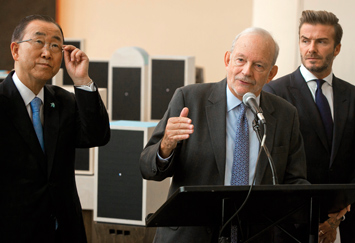
UNITED NATIONS (IPS)– The world’s developing nations, numbering over 130, are still lagging far behind the 34 rich industrialized countries in the race for digital technology.
In the developed world, 81.3 percent of households now have home- Internet access compared with 34.1 percent in the developing world, according to the Geneva-based International Telecommunication Union.
But far worse are the 48 least developed countries, described as the poorest of the world’s poor, with only 6.7 percent households having online access.
U.N. Secretary Ban Ki-moon, left, UNICEF executive director Anthony Lake, center, and English soccer star and UNICEF goodwill ambassador David Beckham holds a press conference at the unveiling of a digital installation created for UNICEF by Google, using mobile technology and social media to deliver messages of children from across the globe, Sept. 24, at the U.N.
And even as digital technology progresses by leaps and bounds, the United Nations says only about 3.2 billion people–out of a total world population of 7.3 billion–are online, leaving the remaining 4.1 billion out in the cold.
Still, mobile cellular subscriptions have made tremendous strides reaching out to almost 7.1 billion worldwide, with over 95 percent of the world population covered by a mobile-cellular signal, according to the U.N.
A recent high-level meeting of the General Assembly reaffirmed one of the basic human rights recognized by the United Nations that every person in today’s digitalized world should have the means to access information and communications technologies (ICTs), described as a “key driver” of sustainable development.
The meeting, which was a 10- year review of the World Summit on the Information Society held in Tunis in 2005, highlighted the significant digital divides–between men and women and between rich and poor nations–which need to be addressed urgently.
As U.N. Secretary-General Ban Ki-moon pointed out more than 80 percent of households in developed countries have internet access but two out of three households in developing countries do not.
“Women are half the global population–yet 200 million fewer women than men have access to the Internet. We must bridge these divides,” he declared.
The outcome World Summit on the Information Society document, adopted at the high-level meeting, also addressed the new and emerging challenges, including cybercrimes, cyber-attacks, and the use of ICTs for terrorist purposes.
The document recognized the leading role for governments in cybersecurity matters relating to national security. It further recognized the important role of international law, especially the U.N. Charter, in building confidence and security in the use of ICTs by member states.
Dr. Ahmed Shaheed, a researcher in the Essex Human Rights, Big Data and Technology Project at the University of Essex in UK, told IPS recent events have heightened the need to be more vigilant against the use of the internet by terrorist groups and there have been calls for increased powers of surveillance for security agencies.
“However, we stress the importance of taking measured and proportionate steps that respect the privacy and the rights of all in a democratic society,” said Dr. Shaheed.
The measures taken should be evidence-based as to their effectiveness, must be anchored in the basic human rights principles of accountability, transparency and non-discrimination, he noted.
“ICT has played an increasingly important role in promoting economic and social development, such as enhancing productivity, facilitating trade, creating quality jobs, providing ICT-based services such as e-health and e-learning, and improving governance,” said Mogens Lykketoft, president of the General Assembly, who convened the highlevel meeting.
The General Assembly also decided to extend the mandate of the Internet Governance Forum for another 10 years, while recognizing that during this period, the forum should continue to show progress on working modalities, and participation of relevant stakeholders from developing countries.
The writer can be contacted at [email protected].












